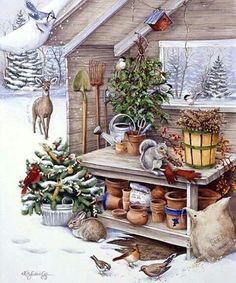Gift Ideas for the Gardener
Winter is actually a very pleasant time for gardeners. There is very little to be done in the garden, so we can rest our weary backs, put our feet up and dream of spring with seed catalogs and Garden Literature.
Garden Literature, you wonder, really?
Let me assure you, there is nothing better than reading about other people’s gardens, and despite the occasional pang of garden envy, we learn a great deal from our readings.
I’m not talking about your standard gardening reference books – the ones that help identify diseases and pests, or instruct on how to grow larger tomatoes. No dear reader, this unique Garden Literature series is something else altogether.
Modern Library Gardening Series
Edited by Michael Pollan
These books are beautifully published (the covers alone catcalled me from a bookstore display table), they make lovely “dip in and out” reading, but most importantly, the series has rediscovered and published out-of-print and forgotten titles from both American and British renowned gardeners.
Once upon a time, in the not-so-distant past, Gardening was the number one leisure activity and there were phenomenal garden writers. They wrote articles in publications, authored books about their gardens, but mostly wrote of the pure delight of having and maintaining their gardens. These are not dry treatises that go on and on about soil augmentation, but funny, down-to-earth and friendly writings that expose both the gardeners’ mistakes and successes. But in each of these slim volumes, whether a hobby, a pastime or as an all encompassing obsession – the joy of gardening shines through.
The publishers’ (Random House) summary of each book will give you an idea of the delight these titles hold for any gardener.
++++++++++++++++++++++++++++++++
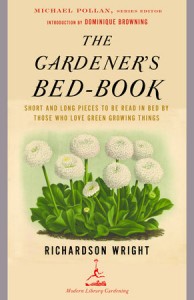 First published in 1929, The Gardener’s Bed-Book is a much beloved gardening classic by the renowned editor of House & Garden magazine in the 1920s and ’30s. Each of its 365 perfectly sized little essays is meant to be read in bed at night after a long day’s work, either real or imagined, in the garden. A charming and mischievously funny companion to curl up with.
First published in 1929, The Gardener’s Bed-Book is a much beloved gardening classic by the renowned editor of House & Garden magazine in the 1920s and ’30s. Each of its 365 perfectly sized little essays is meant to be read in bed at night after a long day’s work, either real or imagined, in the garden. A charming and mischievously funny companion to curl up with.
Old Herbaceous is a classic British novel of the garden, with a title 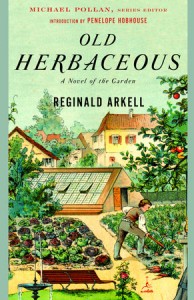 character as outsized and unforgettable as P. G. Wodehouse’s immortal butler, Jeeves. Born at the dusk of the Victorian era, Bert Pinnegar, an awkward orphan child with one leg a tad longer than the other, rises from inauspicious schoolboy days spent picking wildflowers and dodging angry farmers to become the legendary head gardener “Old Herbaceous,” the most esteemed flower-show judge in the county and a famed horticultural wizard capable of producing dazzling April strawberries from the greenhouse and the exact morning glories his Lady spies on the French Riviera, “so blue, so blue it positively hurts.” Sprinkled with nuggets of gardening wisdom, Old Herbaceous is a witty comic portrait of the most archetypal—and crotchety—head gardener ever to plant a row of bulbs at a British country house.
character as outsized and unforgettable as P. G. Wodehouse’s immortal butler, Jeeves. Born at the dusk of the Victorian era, Bert Pinnegar, an awkward orphan child with one leg a tad longer than the other, rises from inauspicious schoolboy days spent picking wildflowers and dodging angry farmers to become the legendary head gardener “Old Herbaceous,” the most esteemed flower-show judge in the county and a famed horticultural wizard capable of producing dazzling April strawberries from the greenhouse and the exact morning glories his Lady spies on the French Riviera, “so blue, so blue it positively hurts.” Sprinkled with nuggets of gardening wisdom, Old Herbaceous is a witty comic portrait of the most archetypal—and crotchety—head gardener ever to plant a row of bulbs at a British country house.
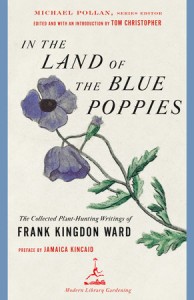 In the Land of the Blue Poppies. During the first years of the twentieth century, the British plant collector and explorer Frank Kingdon Ward went on twenty-four impossibly daring expeditions throughout Tibet, China, and Southeast Asia, in search of rare and elusive species of plants. He was responsible for the discovery of numerous varieties previously unknown in Europe and America, including the legendary Tibetan blue poppy, and the introduction of their seeds into the world’s gardens. Kingdon Ward’s accounts capture all the romance of his wildly adventurous expeditions, whether he was swinging across a bottomless gorge on a cable of twisted bamboo strands or clambering across a rocky scree in fear of an impending avalanche. Drawn from writings out of print for almost seventy-five years, this new collection, edited and introduced by professional horticulturalist and House & Garden columnist Tom Christopher, returns Kingdon Ward to his deserved place in the literature of discovery and the literature of the garden.
In the Land of the Blue Poppies. During the first years of the twentieth century, the British plant collector and explorer Frank Kingdon Ward went on twenty-four impossibly daring expeditions throughout Tibet, China, and Southeast Asia, in search of rare and elusive species of plants. He was responsible for the discovery of numerous varieties previously unknown in Europe and America, including the legendary Tibetan blue poppy, and the introduction of their seeds into the world’s gardens. Kingdon Ward’s accounts capture all the romance of his wildly adventurous expeditions, whether he was swinging across a bottomless gorge on a cable of twisted bamboo strands or clambering across a rocky scree in fear of an impending avalanche. Drawn from writings out of print for almost seventy-five years, this new collection, edited and introduced by professional horticulturalist and House & Garden columnist Tom Christopher, returns Kingdon Ward to his deserved place in the literature of discovery and the literature of the garden.
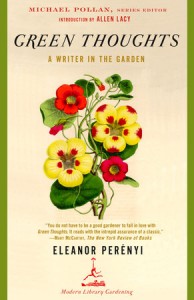 A classic in the literature of the garden, Green Thoughts is a beautifully written and highly original collection of seventy-two essays, alphabetically arranged, on topics ranging from “Annuals” and “Artichokes” to “Weeds” and “Wildflowers.” An amateur gardener for over thirty years, Eleanor Perényi draws upon her wide-ranging knowledge of gardening lore to create a delightful, witty blend of how-to advice, informed opinion, historical insight, and philosophical musing. There are entries in praise of earthworms and in protest of rock gardens, a treatise on the sexual politics of tending plants, and a paean to the salubrious effect of gardening (see “Longevity”). Twenty years after its initial publication, Green Thoughts remains as much a joy to read as ever.
A classic in the literature of the garden, Green Thoughts is a beautifully written and highly original collection of seventy-two essays, alphabetically arranged, on topics ranging from “Annuals” and “Artichokes” to “Weeds” and “Wildflowers.” An amateur gardener for over thirty years, Eleanor Perényi draws upon her wide-ranging knowledge of gardening lore to create a delightful, witty blend of how-to advice, informed opinion, historical insight, and philosophical musing. There are entries in praise of earthworms and in protest of rock gardens, a treatise on the sexual politics of tending plants, and a paean to the salubrious effect of gardening (see “Longevity”). Twenty years after its initial publication, Green Thoughts remains as much a joy to read as ever.
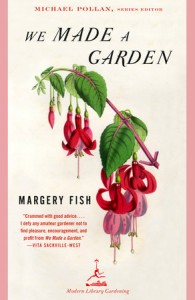 First published in Britain in 1956 and never before available in America, We Made a Garden is the classic story of a unique and enduring English country garden. One of Britain’s most esteemed gardening writers recounts how she and her husband set about creating an exemplary cottage garden from unpromising beginnings on the site of the former farmyard and rubbish heap that surround their newly purchased home in the countryside of Somerset, England. Each imbued with a strong set of horticultural opinions and passions, Mr. and Mrs. Fish negotiate the terrain of their garden, by turns separately and together, often with humorous collisions.
First published in Britain in 1956 and never before available in America, We Made a Garden is the classic story of a unique and enduring English country garden. One of Britain’s most esteemed gardening writers recounts how she and her husband set about creating an exemplary cottage garden from unpromising beginnings on the site of the former farmyard and rubbish heap that surround their newly purchased home in the countryside of Somerset, England. Each imbued with a strong set of horticultural opinions and passions, Mr. and Mrs. Fish negotiate the terrain of their garden, by turns separately and together, often with humorous collisions.
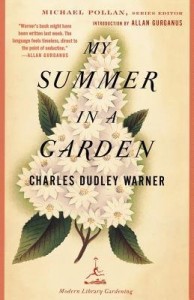 Oft quoted but seldom credited,Charles Dudley Warner’s My Summer in a Garden is a classic of American garden writing and was a seminal early work in the then fledgling genre of American nature writing. Warner—prominent in his day as a writer and newspaper editor—was a dedicated amateur gardener who shared with Mark Twain, his close friend and neighbor, a sense of humor that remains deliciously fresh today. In monthly dispatches, Warner chronicles his travails in the garden, where he and his cat, Calvin, seek to ward off a stream of interlopers, from the neighbors’ huge-hoofed cows and thieving children, to the reviled, though “propagatious,” pusley weed. To read Warner is to join him on his rounds of his beloved vegetable patch, to feel the sun on his sore back, the hoe in his blistered hands, and yet, like him, never to lose sight of “the philosophical implications of contact with the earth, and companionship with gently growing things.”
Oft quoted but seldom credited,Charles Dudley Warner’s My Summer in a Garden is a classic of American garden writing and was a seminal early work in the then fledgling genre of American nature writing. Warner—prominent in his day as a writer and newspaper editor—was a dedicated amateur gardener who shared with Mark Twain, his close friend and neighbor, a sense of humor that remains deliciously fresh today. In monthly dispatches, Warner chronicles his travails in the garden, where he and his cat, Calvin, seek to ward off a stream of interlopers, from the neighbors’ huge-hoofed cows and thieving children, to the reviled, though “propagatious,” pusley weed. To read Warner is to join him on his rounds of his beloved vegetable patch, to feel the sun on his sore back, the hoe in his blistered hands, and yet, like him, never to lose sight of “the philosophical implications of contact with the earth, and companionship with gently growing things.”
++++++++++++++++++++++++++++++++
There are prefaces that entice even before you enter the book itself – from today’s gardening notables such as Jamaica Kincaid, Dominque Browning, and Penelope Hobhouse (don’t gardeners have just the best names?).
Michael Pollan is the contributing editor to this series and perhaps he says it best:
“these writers are some of the great talkers in the rich, provocative, and frequently uproarious conversation that, metaphorically at least, has been taking place over the back fence of our gardens at least since the time of Pliny.”
Here’s a Garden Literature series that will gladden the heart of the gardener on your list.


